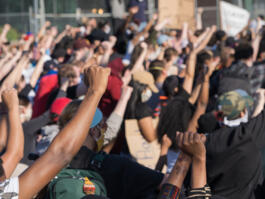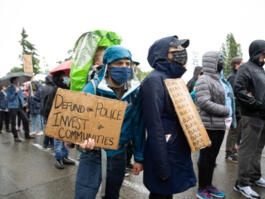Most Say Trump Sides With Police, Democrats With Protesters In Violent Protests
When it comes to the violent anti-police protests that continue in several major cities, most voters are sure of this: President Trump sides with the cops, while Democratic leaders line up with the protesters.
The latest Rasmussen Reports national telephone and online survey finds that 66% of Likely U.S. Voters believe Trump identifies more with the police in violent protests situations. Just 11% think he identifies more with the protesters, while 15% say he tries to be impartial. (To see survey question wording, click here.)
By contrast, 60% believe most national Democratic leaders like House Speaker Nancy Pelosi identify more with the protesters in violent protest situations. Only eight percent (8%) feel they identify more with the police. Twenty-three percent (23%) think they try to be impartial.
Similarly, following anti-police protests in September 2016, voters said then-candidate Trump identified more with the police, while President Obama and Democratic presidential nominee Hillary Clinton were more likely to identify with the protesters.
Separate surveying finds that 55% of voters think most reporters identify with the protesters in violent protest situations. Just five percent (5%) say most reporters identify more with the police, but 30% believe most try to be impartial.
(Want a free daily e-mail update? If it's in the news, it's in our polls). Rasmussen Reports updates are also available on Twitter or Facebook.
The survey of 1,000 Likely Voters was conducted August 5, 2020 by Rasmussen Reports. The margin of sampling error is +/- 3 percentage points with a 95% level of confidence. Field work for all Rasmussen Reports surveys is conducted by Pulse Opinion Research, LLC. See methodology.
Most voters view the ongoing violent protests against police as primarily criminal in nature. Fifty percent (50%) believe political leaders in some major cities like Portland and Seattle are encouraging violent protests by limiting the police response.
Most voters in nearly every demographic category agree that Trump’s on the side of the police, while national Democratic leaders are on the side of the protesters.
Men are more convinced than women that both sides have their bias.
Blacks (79%) are even more convinced than whites (66%) and other minority voters (57%) that the president identifies more with the police. But black voters (53%) are less sure than whites (61%) and other minorities (62%) that national Democratic leaders identify more with the protesters.
Democrats feel more strongly than Republicans and voters not affiliated with either major party that Trump identifies more with the police. Republicans are the most confident that Democrats identify more with the protesters.
Many of the protesters champion efforts to defund local police and shift that money elsewhere. But 66% of all Americans oppose reducing the police budget in the community where they live. Sixty-one percent (61%) believe violent crime will go up in communities that defund the police.
Sixty-seven percent (67%) rate the performance of the police in the area where they live as good or excellent. Just 20% believe the tactics used by their local police are too harsh.
Additional information from this survey and a full demographic breakdown are available to Platinum Members only.
Please sign up for the Rasmussen Reports daily e-mail update (it's free) or follow us on Facebook. Let us keep you up to date with the latest public opinion news.
The survey of 1,000 Likely Voters was conducted August 5, 2020 by Rasmussen Reports. The margin of sampling error is +/- 3 percentage points with a 95% level of confidence. Field work for all Rasmussen Reports surveys is conducted by Pulse Opinion Research, LLC. See methodology.
Rasmussen Reports is a media company specializing in the collection, publication and distribution of public opinion information.
We conduct public opinion polls on a variety of topics to inform our audience on events in the news and other topics of interest. To ensure editorial control and independence, we pay for the polls ourselves and generate revenue through the sale of subscriptions, sponsorships, and advertising. Nightly polling on politics, business and lifestyle topics provides the content to update the Rasmussen Reports web site many times each day. If it's in the news, it's in our polls. Additionally, the data drives a daily update newsletter and various media outlets across the country.
Some information, including the Rasmussen Reports daily Presidential Tracking Poll and commentaries are available for free to the general public. Subscriptions are available for $4.95 a month or 34.95 a year that provide subscribers with exclusive access to more than 20 stories per week on upcoming elections, consumer confidence, and issues that affect us all. For those who are really into the numbers, Platinum Members can review demographic crosstabs and a full history of our data.
To learn more about our methodology, click here.





